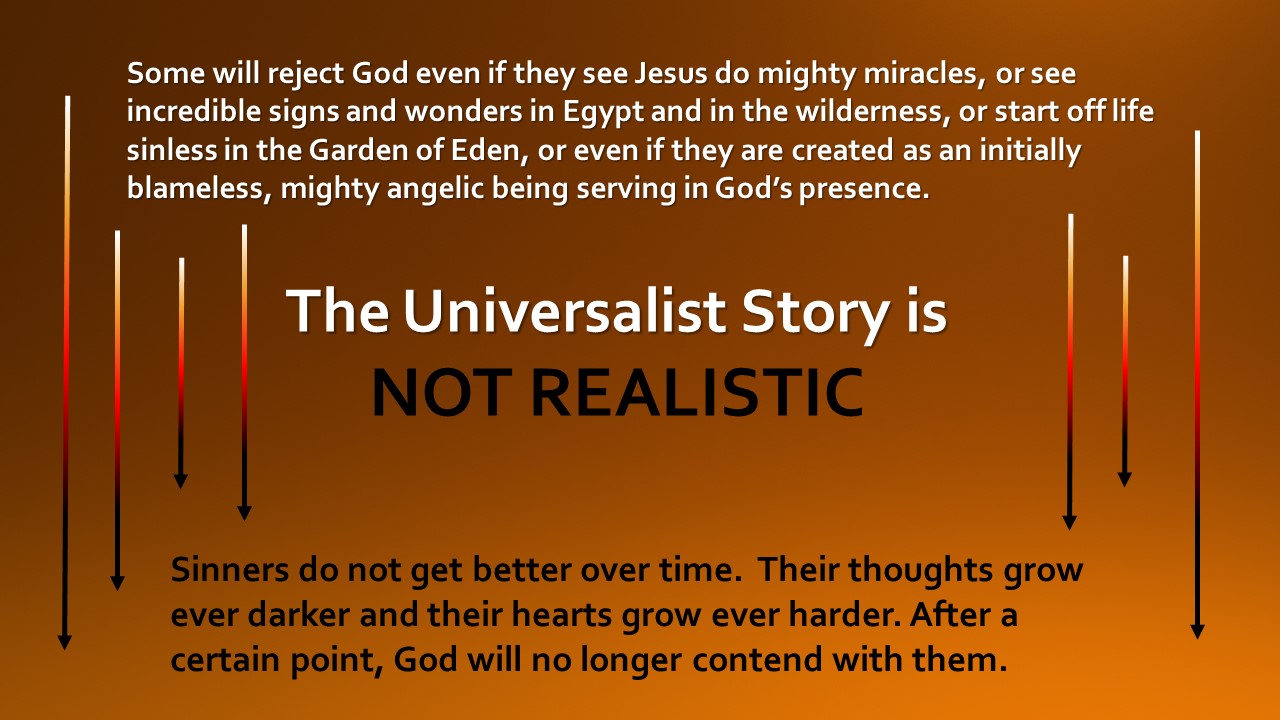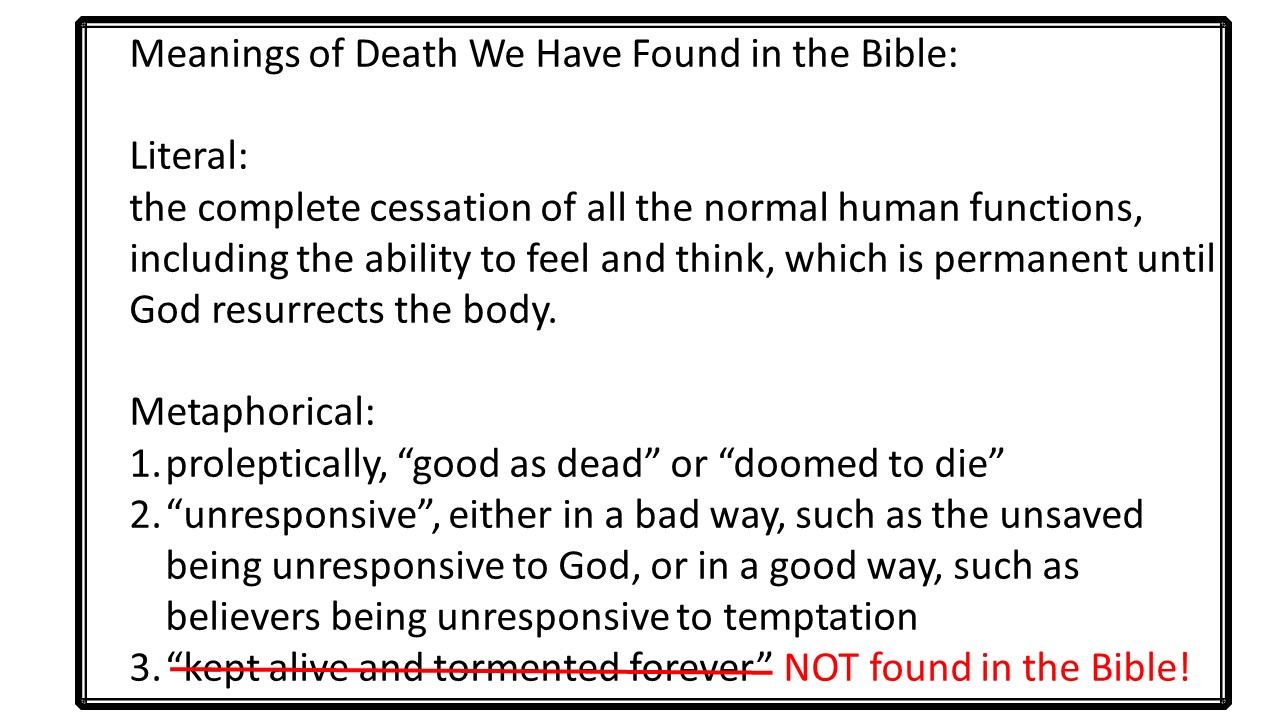- Jun 1, 2017
- 911
- 758
- 60
- Country
- United States
- Gender
- Male
- Faith
- Christian
- Marital Status
- Married

This opening post was originally the second post in a series on my blog which so far has only two posts. Nevertheless, I think this can be read on its own. If you're interested, the first part can be read here: What’s Wrong with the Universalist Story. In the first part, I showed that the Universalist story goes wrong because it has the wrong ultimate goal. In this post, I seek to explain how and why the Universalist story in not realistic.
Redemption plays an important part in many of the stories we love. Take the Star Wars saga for example. Darth Vader is saved in the end and turns back to the light. That resonates with us because redemption is a part of the true story, God’s story, that we are all a part of. But what if not only Darth Vader, but the evil Emperor, and every storm trooper, and all the other bad guys, turned good at the end. The movie would have flopped! It’s not realistic.
But is universal redemption not being realistic just our human opinion and feelings, or is there a Biblical basis for thinking that a story where every single person is redeemed in the end does not align with reality? The Bible confirms our intuition that not everyone will be redeemed.
The Bible shows that some people will rebel against God no matter how much revelation He gives them.
The Bible reveals that some will choose rebellion against God no matter what. Here are some examples:
* In Moses’ day, the Israelites saw numerous amazing signs and wonders in Egypt and in the wilderness. Huge, public miracles were a regular part of their lives. But most of them still rebelled and died in the desert.
* When Jesus walked the earth, He did many astounding miracles in public. Dead coming back to life, blind people seeing, people crippled from birth dancing, and more, were all seen by many. He preached and practiced love and mercy. Many repented and followed Him. But others, seeing the same miracles, plotted to kill Jesus.
* In Revelation we read about the thousand year reign. However you interpret it, in the vision John sees the devil is locked away during this thousand years. Jesus reigns over the earth with justice and blessings for all. Yet, even after a thousand years of this glorious reign of Christ, huge numbers of people choose to rebel against Jesus when the thousand years are up.
* More amazing still, Adam and Eve started off in a perfect paradise. The devil could lie to them, but there is no evidence he could harm them. They chose to listen to the serpent and disobey God.
* Finally, and perhaps most importantly, the devil started off as a good angel living in a perfect Heaven in the bright light of God’s truth and love. Without any source of evil in his world, the devil chose to rebel. He took many of the angels with him.
The point is simply this: in the Bible’s grand story, we see time and time again that some of God’s creatures will choose to rebel against Him if they are allowed to. This rebellion has brought massive suffering and loss to this current earth. And if these people were allowed to live in the New Earth, there is no reason to believe they would not ruin it as well.
The Universalist responds to all this by suggesting that if they were given enough time, everyone would eventually repent and accept God’s grace. In this sense, Universalists are a bit like those who believe in unguided evolution. They hope that a lot of time can make something happen that usually doesn’t happen. But based on biblical principles, we can see why more time, even eternal time, will not help the unrighteous come to God. In fact, more time only makes things worse.
The Bible teaches that over time sinners get worse, their minds become darker, and their hearts become harder.
The Universalist imagines a situation where God patiently continues working with the unrighteous for however long it takes for them to be saved. Some Universalists specifically imagine this happening after the unrighteous have died and been consigned to the lake of fire. But does the Bible indicate that God will put up with and contend with the unrighteous for however long it takes? Actually, no.
NIV Genesis 6:3 Then the LORD said, "My Spirit will not contend with humans forever, for they are mortal; their days will be a hundred and twenty years."
Genesis chapter 5 reports people living for seven, eight, and even nine hundred years. God, in His perfect wisdom and righteousness, decided that was too long a time for Him to work with people, so He announced that our life spans would be reduced to a hundred and twenty years. This does not fit very well with the Universalist narrative.
But why would God do that? I’m sure it’s not due to any defect or lack on God’s part. I think a more likely explanation is that waiting longer than about 120 years for someone to respond to God in the right way is not effective. God designed us so that the decisions we make not only change the environment around us, but also change our hearts and our minds. This good design enables us to learn and grow in Christ when we are following God. However, when people sin, their thinking becomes increasingly futile and their hearts become increasingly hard.
Romans 1:21 For although they knew God, they neither glorified him as God nor gave thanks to him, but their thinking became futile and their foolish hearts were darkened.
22 Although they claimed to be wise, they became fools
Those who do evil tend to get worse, not better, over time:
NIV 2 Timothy 3:12 In fact, everyone who wants to live a godly life in Christ Jesus will be persecuted,
13 while evildoers and impostors will go from bad to worse, deceiving and being deceived.
It may very well be that God limited his efforts to win people to 120 years because by that point (and for many people, sooner) they have become so foolish, hardened, and deceived that there is no hope of their freely choosing to love Him. They have become fools as described in Proverbs:
NIV Proverbs 1:7 The fear of the LORD is the beginning of knowledge, but fools despise wisdom and instruction.
NIV Proverbs 13:19 A longing fulfilled is sweet to the soul, but fools detest turning from evil.
NIV Proverbs 27:22 Though you grind a fool in a mortar, grinding them like grain with a pestle, you will not remove their folly from them.
It’s not that God has stopped loving them. It’s just that they reach a point where they despise instruction, detest turning from evil, and resist all efforts to remove evil from them so strongly that they can no longer be saved. Of course, God could override their wills, but if He wants them to love Him freely then that option is off the table. The kindest thing He can do for them is to utterly destroy them. Allowing them to live on in misery and darkness is unthinkable.
This would certainly explain why God assigned a mighty angel to guard the tree of life after expelling Adam and Eve from the Garden of Eden. Giving sinners many thousands of years of life, or worse, eternal life, would only result in greater misery.
In this post I have tried to explain why the Universalist idea that everyone could be saved if they were given a combination of the right evidence and enough time is unrealistic. Being unrealistic is only one of many problems which plague the Universalist metanarrative. A more fundamental problem is that the unsaved cannot repent in Hell, because in Hell they perish (John 3:16), die (Romans 6:23), are destroyed in body and soul (Matthew 10:28), and are burned to ashes (2 Peter 2:6).



